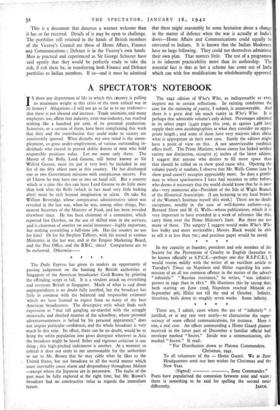A SPECTATOR'S NOTEBOOK I S there any department of life in
which this country is pulling its maximum weight at this crisis of the most critical war in its history? Allegations—I will not go so far as to say evidence— that there is not abound and increase. Trade unionists, and many employers too, affirm that industry, even war-industry, has reached nothing like a hundred per cent. of its potential production. Scientists, or a section of them, have been complaining this week that they and the contribution they could make to victory are consistently ignored. What disturbs my own mind is the unem- ployment, or gross under-employment, of various outstanding in- dividuals who exceed in proved ability dozens of men who hold responsible positions today. Let me name only three. The Master of the Rolls, Lord Greene, still better known as Sir Wilfrid Greene, must (to put it very low) be included in any list of the fifty ablest men in this country. He has discharged one or two Government missions with conspicuous success. For all I know he may have one or two on hand still. But a country which at a time like this can leave Lord Greene to do little more than look after the Rolls (which in fact need very little looking after) must be rich beyond imagination in talent. Or take Sir William Beveridge, whose conspicuous administrative talent was revealed in the last war, when he was, among other things, Per- manent Secretary of the Ministry of Food, and has been revealed elsewhere since. He has been chairman of a committee, which reported last October, on the use of skilled men in the services, and is chairman of another on social insurance—highly important, but nothing resembling a full-time job. Has the country no use for him? Or for Sir Stephen Tallents, with his record at various Ministries in the last war, and at the Empire Marketing Board, and the Post Office, and the B.B.C.. since? Comparisons are to be eschewed. Otherwise-


























 Previous page
Previous page